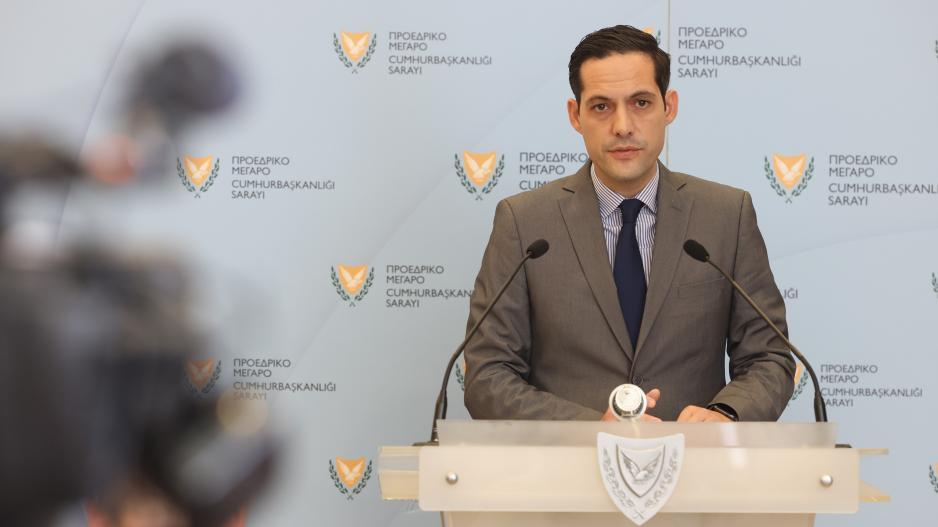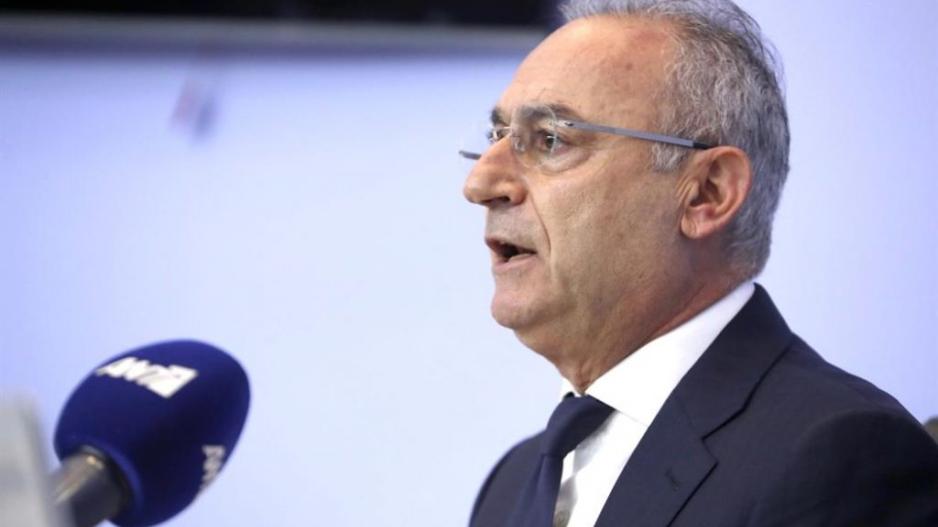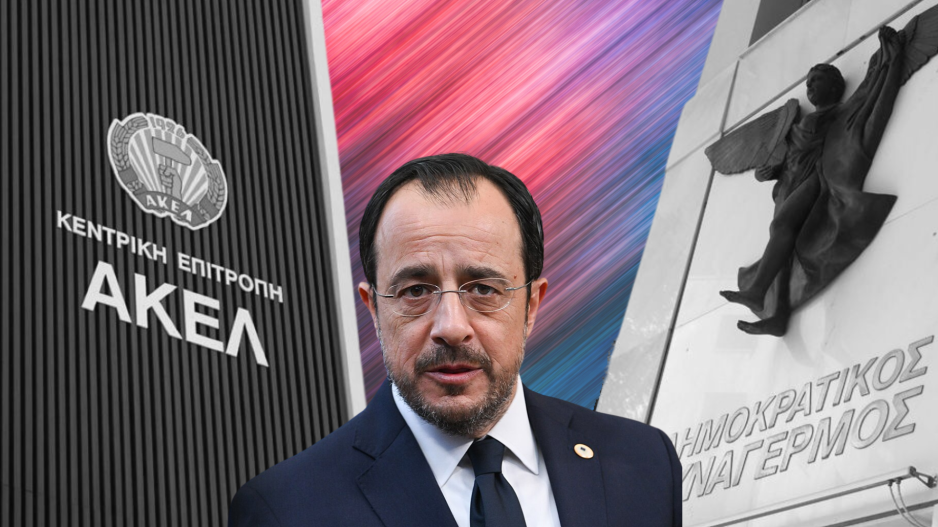2 Winners and 1 (Potential) Loser: The Clash Between the Government, DISY, and AKEL Over Zero VAT
With AKEL Positioned as the Central Opponent, and by Casting a Net Towards DISY’s Base, Christodoulides Continues the Political Path That Got Him Elected
The press releases between the government and AKEL unfolded in a highly polarized atmosphere yesterday, centering on the reinstatement of a zero VAT rate on certain essential goods. The spokesperson of DISY also made a sarcastic remark about the government's shift in approach on this matter, while former party president Averof Neofytou criticized the government's "untargeted" measures, as he described them. The government chose to respond exclusively to AKEL.
Just four days before the crucial informal trilateral meeting in New York, with the Cyprus issue on the agenda, a statement by President Christodoulides on the morning of October 10, after attending the WISTA International Global Conference in Limassol, sparked political tensions. This disrupted the fragile national consensus that had emerged after the National Council meeting on October 7, where the Cyprus issue had been the common focal point.
Regarding the inflation, the President stated, “I hear many cheap, appealing, public statements. I want to remind you where these appealing statements led us in the past – to memoranda, to social grocery stores, and many other consequences.” He added, “Let’s not resort to populism, exploiting the difficult – I acknowledge – conditions that some of our compatriots are going through. We’ve seen what their policies have brought and where they’ve led the country.” His comments ignited a new clash with AKEL on economic and cost-of-living issues.
Just hours before the official announcement of the extension of the zero VAT on essential goods (including baby diapers, adult diapers, baby formula, women’s hygiene products, as well as fruits and vegetables), President Christodoulides said he was heading to Nicosia for a meeting with Finance Minister Makis Keravnos, with the agenda also covering the issue of high living costs.
A few hours later, on the afternoon of October 10, the government officially announced the reinstatement of the zero VAT rate on certain essential items. This raised questions about why the decision to extend the measure was delayed by 10 days, especially since it had been widely known that the timeline for the measure would expire on October 1.
DISY’s criticism focused on this point, with the party's spokesperson, Onoufrios Koullas, stating, “When a government removes the Value Added Tax on October 1 and reinstates it on the 10th of the same month, what can be said? They simply have no idea what they’re doing.”
“Nikos Christodoulides became President of the country but will forever remain the government spokesman for Anastasiades. He’s been President for almost two years and has been part of the government for 12 years, yet he insists on finding excuses in the past, even going so far as to exonerate the banks and bankers,” said AKEL spokesperson Giorgos Koukoumas. “However, this pales in comparison to the fact that the government doesn’t know where it stands or where it’s going when it comes to dealing with the cost-of-living crisis and the major problems facing society. Just days ago, they announced the termination of the zero VAT rate on some products, and today—after the backlash—they’ve reinstated it,” Koukumas added.

In response to AKEL’s statement, government spokesperson Konstantinos Letymbiotis remarked, “AKEL, after 11 years in opposition—where society has placed it—still bears the images of social grocery stores, the deadly explosion at Mari, economic collapse, 21 consecutive credit downgrades of the economy, and skyrocketing unemployment at 17%.” He continued, “We understand that AKEL’s leadership cannot grasp responsible fiscal and developmental policies and remains stuck in unbridled populism and outdated policies of other regimes that history has left behind. We are separated by a vast gap with AKEL's leadership; the differences are clear. As a government, we invest in policies and projects that build a better future for our country,” he concluded.
The government-AKEL conflict continued, with AKEL’s press office responding, “If everything is going so well in the Cypriot economy and society, as the government spokesman claims, why is the government so concerned about what AKEL denounces? Even after 12 years and three successive governments, why do they resort to distortion and lies, acting as the spokespeople of the banks, Anastasiades, and DISY? Perhaps the king is truly naked. Could it be that they don’t convince the public because many people are crushed by ongoing impoverishment due to the rising cost of living?”
It should be noted that as early as the end of September, both DISY and AKEL had called for the extension or replacement of the anti-cost-of-living measures that were due to expire on October 1, urging targeted actions and criticizing the Christodoulides government for being "deaf" to society’s needs in the face of high prices.
The pressure, however, did not come solely from the two major parties or from the public's reaction to the withdrawal of even these limited support measures against rising costs. Coalition parties also called for new relief measures during their regular meeting with Deputy Minister to the President Irini Piki at the Presidential Palace. They demanded that the government consider taking new steps to counterbalance the ongoing price increases, which have slowed but still persist.

“We have seen the government over the past two years try to combat rising costs and ease household burdens by implementing various measures. Unfortunately, these measures failed because they were mostly broad-based, with no targeting. In most cases, the benefit was quickly absorbed by the market and never reached consumers,” wrote former DISY president Averof Neofytou in an opinion piece published in the Sunday edition of Politis on October 6.
Yesterday, the former Presidential candidate criticized the government's decision to reinstate the zero VAT rate through the social media platform X (formerly Twitter). He specifically wrote, “The President missed the mark. In the morning, he announced targeted measures for high living costs. But by noon, we got untargeted ones. What can I say? Ignorance? Confusion? They don’t know, don’t want to, or simply can’t? What’s certain is that there will be no real relief for the poor, while the middle class risks being pushed to the poverty line.”

While the decision of the Presidential Palace to engage in a heated confrontation with AKEL so close to the informal trilateral meeting in New York raises eyebrows, the sharp clash with AKEL and the much milder approach towards DISY comes as no surprise.
Christodoulides and his government’s focus on clashing with AKEL can be interpreted as part of a broader political strategy. A vital segment of DISY voters supported him in 2023, and he aims to maintain these ties, viewing them as crucial for any potential re-election bid in 2028. With AKEL positioned as the central opponent, and by casting a net towards DISY’s base -even with occasional mild criticism towards the party's leadership-, Christodoulides continues the political path that got him elected—with solid support from 'centrist' parties' voters and a significant portion of DISY supporters.
In this triangular conflict between the government and the two parties, AKEL is considered a beneficiary of Christodoulides' strategy, as it is elevated as the government's “convenient opponent,” with the next presidential elections as a milestone. This strengthens AKEL's narrative of being “the country’s genuine opposition” and aids in its strategy of presenting itself as the “alternative power proposal” for 2028, potentially capitalizing on further defections from DISY to Christodoulides.
This situation could create strategic challenges for DISY, as the government elevates AKEL as its main opponent while keeping open channels with its own party's base—as evidenced by the frequent appointments of DISY members and supporters to state and government positions by the Christodoulides government. The repetition of the party's fragmentation and significant defections to Christodoulides, which helped make him president, remains a distinct possibility. After all, history tends to repeat itself—first as tragedy, then as farce.






